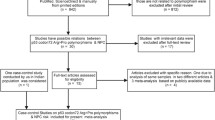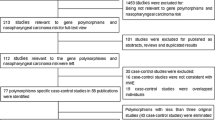Abstract
The P53 codon 72 polymorphism has been identified as a critical biomarker in modifying the risk of nasopharyngeal cancer (NPC). Many studies have investigated the association between the polymorphism of P53 codon 72 and NPC risk; however, the findings across the published studies are inconsistent and inconclusive. To acquire a more precise assessment for this association, we conducted an updated meta-analysis. The PubMed, Embase, Web of Science, and Wanfang databases were searched for relevant case–control studies. Totally, seven independent publications with 1,133 cases and 1,678 controls were retrieved. The pooled odds ratio (OR) with corresponding 95 % confidence interval (95 % CI) was calculated. Increased risk of NPC was observed among individuals carrying the variant allele and genotypes of P53 codon 72 (OR Pro vs. Arg = 1.32, 95 % CI 1.18–1.47, P OR < 0.001; OR ProPro vs. ArgArg = 1.90, 95 % CI 1.51–2.39, P OR < 0.001; OR ProArg + ProPro vs. ArgArg = 1.33, 95 % CI 1.13–1.57, P OR = 0.001; OR ProPro vs. ArgArg + ProArg = 1.65, 95 % CI 1.35–2.01, P OR < 0.001). Stratified analyses by ethnicity and source of controls also identified this significant relationship in Asians, Caucasians, and hospital-based case–control studies. There was no publication bias risk in our study. The updated meta-analysis supports the evidence that the polymorphism of P53 codon 72 is a risk factor for the development of NPC among the populations of both Asian and Caucasian.


Similar content being viewed by others
References
Guigay J. Advances in nasopharyngeal carcinoma. Curr Opin Oncol. 2008;20:264–9.
Lee AW, Ng WT, Chan YH, Sze H, Chan C, Lam TH. The battle against nasopharyngeal cancer. Radiother Oncol. 2012;104:272–8.
O’Neil JD, Owen TJ, Wood VH, Date KL, Valentine R, Chukwuma MB, et al. Epstein-Barr virus-encoded EBNA1 modulates the AP-1 transcription factor pathway in nasopharyngeal carcinoma cells and enhances angiogenesis in vitro. J Gen Virol. 2008;89:2833–42.
Horikawa T, Yoshizaki T, Kondo S, Furukawa M, Kaizaki Y, Pagano JS. Epstein-Barr virus latent membrane protein 1 induces snail and epithelial–mesenchymal transition in metastatic nasopharyngeal carcinoma. Br J Cancer. 2011;104:1160–7.
Yu MC, Yuan JM. Epidemiology of nasopharyngeal carcinoma. Semin Cancer Biol. 2002;12:421–9.
Li L, Wu J, Sima X, Bai P, Deng W, Deng X, et al. Interactions of miR-34b/c and TP-53 polymorphisms on the risk of nasopharyngeal carcinoma. Tumor Biol. 2013;34:1919–23.
Hu S, Zhou G, Zhang L, Jiang H, **ao M. The effects of functional polymorphisms in the TGFbeta1 gene on nasopharyngeal carcinoma susceptibility. Otolaryngol Head Neck Surg. 2012;146:579–84.
Qin HD, Shugart YY, Bei JX, Pan QH, Chen L, Feng QS, et al. Comprehensive pathway-based association study of DNA repair gene variants and the risk of nasopharyngeal carcinoma. Cancer Res. 2011;71:3000–8.
Ben Chaaben A, Busson M, Douik H, Boukouaci W, Mamoghli T, Chaouch L, et al. Association of IL-12p40 +1188 A/C polymorphism with nasopharyngeal cancer risk and tumor extension. Tissue Antigens. 2011;78:148–51.
McDermott AL, Dutt SN, Watkinson JC. The etiology of nasopharyngeal carcinoma. Clin Otolaryngol Allied Sci. 2001;26:82–92.
Levine AJ. p53, the cellular gatekeeper for growth and division. Cell. 1997;88:323–31.
Goodsell DS. The molecular perspective: p53 tumor suppressor. Oncologist. 1999;4:138–9.
Hickman ES, Helin K. The p53 tumor suppressor protein. Biotechnol Genet Eng Rev. 2000;17:179–211.
Hou J, Jiang Y, Tang W, Jia S. p53 codon 72 polymorphism and breast cancer risk: a meta-analysis. Exp Ther Med. 2013;5:1397–402.
Wang S, Chen L, Zhao Q, Rong H, Wang M, Gong W, et al. Effect of TP53 codon 72 and MDM2 SNP309 polymorphisms on survival of gastric cancer among patients who receiving 5-fluorouracil-based postoperative adjuvant chemotherapy. Cancer Chemother Pharmacol. 2013;71:1073–82.
Szymanska K, Chen JG, Cui Y, Gong YY, Turner PC, Villar S, et al. TP53 R249S mutations, exposure to aflatoxin, and occurrence of hepatocellular carcinoma in a cohort of chronic hepatitis B virus carriers from Qidong, China. Cancer Epidemiol Biomarkers Prev. 2009;18:1638–43.
Szymanska K, Hainaut P. TP53 and mutations in human cancer. Acta Biochim Pol. 2003;50:231–8.
Yang Z, Nie S, Zhu H, Wu X, Jia S, Luo Y, et al. Association of p53 Arg72Pro polymorphism with bladder cancer: a meta-analysis. Gene. 2013;512:408–13.
Tang W, Zhou X, Nie S, Yang Z, Zhu H, Wu X, et al. Association of p53 Arg72Pro polymorphism with gastric cancer: a meta-analysis. Biomarkers. 2012;17:597–603.
Tang W, He X, Chan Y, Luo Y. Lack of association between p53 codon 72 polymorphism and endometrial cancer: a meta-analysis. Cancer Epidemiol. 2012;36:e153–7.
Hadhri-Guiga B, Toumi N, Khabir A, Sellami-Boudawara T, Ghorbel A, Daoud J, et al. Proline homozygosity in codon 72 of TP53 is a factor of susceptibility to nasopharyngeal carcinoma in Tunisia. Cancer Genet Cytogenet. 2007;178:89–93.
Sousa H, Santos AM, Catarino R, Pinto D, Vasconcelos A, Lopes C, et al. Linkage of TP53 codon 72 pro/pro genotype as predictive factor for nasopharyngeal carcinoma development. Eur J Cancer Prev. 2006;15:362–6.
Tiwawech D, Srivatanakul P, Karaluk A, Ishida T. The p53 codon 72 polymorphism in Thai nasopharyngeal carcinoma. Cancer Lett. 2003;198:69–75.
Tsai MH, Lin CD, Hsieh YY, Chang FC, Tsai FJ, Chen WC, et al. Prognostic significance of the proline form of p53 codon 72 polymorphism in nasopharyngeal carcinoma. Laryngoscope. 2002;112:116–9.
**ao M, Zhang L, Zhu X, Huang J, Jiang H, Hu S, et al. Genetic polymorphisms of MDM2 and TP53 genes are associated with risk of nasopharyngeal carcinoma in a Chinese population. BMC Cancer. 2010;10:147.
Yung WC, Ng MH, Sham JS, Choy DT. p53 codon 72 polymorphism in nasopharyngeal carcinoma. Cancer Genet Cytogenet. 1997;93:181–2.
Cochran WG. The comparison of percentages in matched samples. Biometrika. 1950;37:256–66.
Higgins JP, Thompson SG, Deeks JJ, Altman DG. Measuring inconsistency in meta-analyses. BMJ. 2003;327:557–60.
Mantel N, Haenszel W. Statistical aspects of the analysis of data from retrospective studies of disease. J Natl Cancer Inst. 1959;22:719–48.
DerSimonian R, Laird N. Meta-analysis in clinical trials. Control Clin Trials. 1986;7:177–88.
Egger M, Davey Smith G, Schneider M, Minder C. Bias in meta-analysis detected by a simple, graphical test. BMJ. 1997;315:629–34.
Stuck AE, Rubenstein LZ, Wieland D. Bias in meta-analysis detected by a simple, graphical test. Asymmetry detected in funnel plot was probably due to true heterogeneity. BMJ. 1998;316:469. author reply 470–461.
Huang X, Cao Z, Zhang Z, Yang Y, Wang J, Fang D. No association between vitamin D receptor gene polymorphisms and nasopharyngeal carcinoma in a Chinese Han population. Biosci Trends. 2011;5:99–103.
Zheng J, Liu B, Zhang L, Jiang L, Huang B, You Y, et al. The protective role of polymorphism MKK4-1304 T > G in nasopharyngeal carcinoma is modulated by Epstein-Barr virus infection status. Int J Cancer. 2012;130:1981–90.
Harms K, Nozell S, Chen X. The common and distinct target genes of the p53 family transcription factors. Cell Mol Life Sci. 2004;61:822–42.
Mills AA. p53: link to the past, bridge to the future. Genes Dev. 2005;19:2091–9.
Lu Y, Huang GL, Pu XX, He YX, Li BB, Liu XY, et al. Association between PIN1 promoter polymorphisms and risk of nasopharyngeal carcinoma. Mol Biol Rep. 2013;40:3777–82.
**e L, Liang XN, Deng Y, Qin X, Li S. TNF-alpha-308G/A polymorphisms and nasopharyngeal cancer risk: a meta-analysis. Eur Arch Otorhinolaryngol. 2013;270:1667–72.
Wei Y, Zhou T, Lin H, Sun M, Wang D, Li H, et al. Significant associations between GSTM1/GSTT1 polymorphisms and nasopharyngeal cancer risk. Tumor Biol. 2013;34:887–94.
Nie Y, Sun Y, Wang Y, Liu C, Zhao C, Luo B. Epstein-Barr virus gene polymorphism in different parts of the same nasopharyngeal carcinoma patient. Arch Virol. 2013;158:1031–7.
Cheng YJ, Wolkenhauer M, Bumbu GG, Gutmann JS. A facile route to reassemble titania nanoparticles into ordered chain-like networks on substrate. Macromol Rapid Commun. 2012;33:218–24.
Key TJ, Schatzkin A, Willett WC, Allen NE, Spencer EA, Travis RC. Diet, nutrition, and the prevention of cancer. Public Health Nutr. 2004;7:187–200.
Nayak MS, Yang JM, Hait WN. Effect of a single nucleotide polymorphism in the murine double minute 2 promoter (SNP309) on the sensitivity to topoisomerase II-targeting drugs. Cancer Res. 2007;67:5831–9.
Boersma BJ, Howe TM, Goodman JE, Yfantis HG, Lee DH, Chanock SJ, et al. Association of breast cancer outcome with status of p53 and MDM2 SNP309. J Natl Cancer Inst. 2006;98:911–9.
Conflicts of interest
None
Author information
Authors and Affiliations
Corresponding authors
Rights and permissions
About this article
Cite this article
Cai, K., Wang, Y., Zhao, X. et al. Association between the P53 codon 72 polymorphism and nasopharyngeal cancer risk. Tumor Biol. 35, 1891–1897 (2014). https://doi.org/10.1007/s13277-013-1254-5
Received:
Accepted:
Published:
Issue Date:
DOI: https://doi.org/10.1007/s13277-013-1254-5




